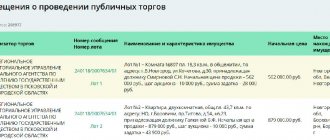How is production carried out?
Algorithm for bankruptcy proceedings for a legal entity:
- A manager is appointed for the bankrupt enterprise (based on the results of consideration of the claim for the introduction of bankruptcy proceedings). All managerial powers are transferred to him: he will generate reports, terminate and conclude transactions, manage the company’s accounts, etc.
- They issue an order to remove the seals and that the previous leaders are relieved of their duties.
- The Federal Tax Service is notified of the start of bankruptcy proceedings.
- They publish information about the bankrupt in the media with an address for accepting applications from creditors.
- Data on the bankrupt’s assets is generated. Collect receivables.
- Completing the competition mass.
- Create a register of creditors.
- Organize the sale of property.
- Eliminate obligations to creditors.
- Closing the current account.
- They prepare a report on the work done and submit it to the court.
- The court makes a decision on bankruptcy.
- The final liquidation entry is made in the Unified State Register of Legal Entities.
FAQ
How to receive a pension when selling property in bankruptcy?
The debtor can count on receiving a pension in the amount of the minimum wage - in Moscow this is approximately 14,000 rubles. The rest of the pension goes to the bankruptcy estate. The financial manager sends a message about transferring the pension to a special account in the Pension Fund.
In practice, the pension is not withdrawn if the manager was appointed at your suggestion. If the debtor still has dependents, expenses for rent, treatment, he has the right to declare this to the court in order to receive money for these expenses.
What should I do if the court imposed debt restructuring, and I wanted to sell the property?
In this case, nothing can be done. Now standard procedures will apply: creditors, the manager, or you yourself must submit a debt repayment plan to a vote. If the development of a plan is not possible, the financial manager will apply to cancel the debt restructuring.
Next, the court will introduce the sale of property. Usually, debtors request the transition to the sale of property when submitting an application to the Arbitration Court: they present evidence that financial recovery is beyond their power - there is no money to pay creditors.
Can I buy a phone without my financial manager's consent?
Debtors can spend free funds at their own discretion. You cannot enter into transactions worth more than 50,000 rubles or make expensive purchases. If a phone costs, for example, 12,000 rubles, you can buy it.
Can medical expenses be excluded in bankruptcy? I was diagnosed 3 months ago. back
Yes, the debtor can petition to exclude money from the bankruptcy estate for treatment, rent and other vital expenses. Money can be excluded within the limits of monthly income - for example, if the salary is 35,000 rubles, you can receive no more than this amount. It is important to confirm expenses: medical reports, checks and receipts.
Bankruptcy of individuals persons Sale of property
Author of the article Konstantin Milantiev
Publications 222
More information →
about the author
Expert in the field of bankruptcy of individuals. He has been an active arbitration manager since 2015. Konstantin’s publications are published in various expert publications and media. Active participant in conferences, seminars and discussions on amendments to the current legislation of the Russian Federation on bankruptcy.
Rate this article
103 likes
Share with friends:
How does the sale of property proceed in the event of bankruptcy of an enterprise?
The value of assets is determined during the inventory and is included in the property inventory list. To determine the price of fixed assets, an expert assessment is carried out. The final assessment reports are sent to the Unified Federal Register of Bankruptcy Information.
The sale of property of a legal entity is carried out through tenders (competitions or auctions).
Complete data on the property being sold is published in official resources (Kommersant), plus, at the will of creditors or the manager, posted on any website.
The arbitration court examines and approves the provision on the terms of sale prepared by the bankruptcy trustee, which contains the terms of sale, the starting price of the bankruptcy estate and other important conditions.
Features of the procedures
The auction is carried out by raising the price of the lot by an interval of 5-10% accepted by the organizer.
Only limitedly negotiable property (sports, military weapons, etc.) is sold at closed auctions. Only holders of special permits can participate in closed auctions.
A competition is used to sell cultural heritage objects (historical and cultural monuments). The acquirer of such property undertakes to preserve, maintain and protect it.
Auctions and trades can be held electronically. To do this, the manager signs an agreement with the operators of electronic platforms. At state sites, registration is free; at private sites, there may be a fee for this. The registration fee may be supplemented by a specific percentage of the sale of the lot.
Bidding algorithm
The start of trading must be publicly announced by the manager (one month before, with exact dating). Applicants who have submitted a deposit, if necessary, participate. Persons with false information, documents, submitted an incorrect (in form) application, who have not paid a deposit, will be denied participation.
The auction winner is the last bidder with the highest value.
The results of the auction are recorded in the protocol, it is signed and sent to the winner and the manager (within two days).
The deal is secured by a purchase and sale agreement between the manager and the winning bidder. The winner deposits funds within thirty days after the agreement is endorsed. The money ends up in the bankruptcy estate.
Everyone except the winner gets their deposit returned. The winner signs the contract within five days, deposits money within a month and receives what was purchased.
You can complain about violations during bidding either to the court or to the Federal Antimonopoly Service. If the complaint is upheld, the transactions will become invalid and the property will be resold.
Spouses' property: will the debtor's family suffer in bankruptcy?
The legal status of property acquired jointly during marriage is specifically regulated by the legislator. The Family Code of the Russian Federation speaks about this (Article 34 of the RF IC).
Example:
Case No. A54-1301/2016 presents a situation where the interests of the bankrupt’s spouse are required to be taken into account as part of the sale of the debtor’s property in bankruptcy proceedings. The debtor's wife started dividing the property after her husband applied to arbitration and bankruptcy was declared against him.
The woman was refused both in the court of general jurisdiction and in the arbitration court, but the Supreme Court of the Russian Federation, in its decision No. b-KP 8-1, took her side and indicated that the second spouse retained the right to a share of the property.
In practice, in a marriage, a regime of joint ownership arises, which means that according to the general rules, if the spouses do not divorce and do not divide property, everything they own is sold, after which half of the proceeds from the auction are returned to the second spouse.
Completion of the procedure for selling property in bankruptcy
The procedure ends with a report from the manager based on the results of the bankruptcy proceedings. The decision on completion is made by the arbitration court, after which, no later than 60 days, information about this is received from the judge to the tax authorities, who remove the legal entity from the Unified State Register of Legal Entities within 5 days. The company no longer exists. The bankruptcy trustee is paid a remuneration (Article 20.6 of Federal Law No. 127).
Briefly, the procedure for selling property in the event of bankruptcy of a legal entity is as follows:
- Manager accreditation.
- Inventory of property.
- Property valuation.
- Approval of the terms and conditions of sale.
- Sale of property.
- Results report.
Movable property and money - how to exclude from the bankruptcy estate
The sale of movable property is carried out taking into account economic feasibility. If the income from the sale of an object does not provide a significant replenishment of the bankruptcy estate, then the financial manager has the right to exclude it from the auction.
The debtor has the right to appeal in court the inclusion of property in the bankruptcy estate or ask to exclude an amount of money: in the amount of the subsistence minimum, the cost of medicines, or, for example, payment for renting a living space. To do this, you need to submit a petition in which you justify your request - why you need this money and property.
Sample petition to exclude funds from the bankruptcy estate (35.1 KB)
The court will exclude from the CM property that is necessary for the normal life of a person and his dependents.
The law establishes a period for the sale of property of 6 months. In practice, if no tenders were held, the financial manager submits to the court reports on the work done on average for 4 months. Bidding will increase the period, the procedure will take 8-12 months.
To prevent the consequences of the property sale procedure from becoming a disappointment, do not try to hide the property. If hidden property is discovered, you risk being denied loan write-off. The court does not release unscrupulous borrowers from debts.
Still have questions? You can learn more about how property is sold during bankruptcy of individuals, as well as protect your rights, by consulting with our lawyer. To consult on all questions regarding bankruptcy or get legal support, call us by phone or write online. We will help you write off your debts!
Free consultation on debt relief
Leave your phone number, a specialist will call you back within 1 minute
The procedure for selling property in the event of bankruptcy of an individual
An individual can also be declared bankrupt. The sale of his property is an extreme measure that is resorted to if the earlier stage of bankruptcy - debt restructuring - is impossible for a number of reasons or was carried out with violations. The sale is carried out as follows:
- The insolvency administrator describes all of the debtor's property. This could be transport, real estate, securities, expensive furniture, equipment, etc. The manager must analyze the citizen’s transactions over the last 3 years. Agreements, especially deeds of gift, with interdependent persons (spouses, children, parents, subordinates, etc.) can be canceled, then the property ends up in the bankruptcy estate.
- They conduct an assessment of property with the involvement of independent appraisers, if necessary; they will establish the market value of things in their report.
- They publish an announcement about bidding, which is held as an open electronic auction. All associated expenses are covered by the citizen.
- An arbitration manager or a specialized independent company conducts auctions - no later than two months and in three stages. The first is a bullish auction. The auction step here is 5-10% of the starting price. The one who offers the most money wins. The second stage - if no one showed up to participate in the auction (or there is only one participant), then the organizer has the right to recognize it as invalid. The starting price compared to the market price is reduced by 10-30%. The third stage is a public offer with bearish trading. The reduction in property price can reach 90%. Unsold items of an individual are returned to him subject to the conditions of clause 5 of Art. 213.26 Federal Law No. 127. The transfer of unrealized property to a creditor in the event of a citizen’s bankruptcy is possible: by its legal nature, this option is close to compensation (Article 142.1 of Federal Law No. 127). Clause 1 of Art. allows this article to be applied to citizens. 213.1 Federal Law No. 127.
- Settle accounts with creditors (in accordance with Article 213.27 of Federal Law No. 127), pay legal costs, and pay remuneration to the manager and independent organizer.
- The manager reports on the sale of an individual's belongings to the court and creditors. All evidence of the facts of the sale and settlements with creditors must be attached to such a report. If the proceeds are not enough to pay all debts, the remaining ones are written off, the individual becomes bankrupt, and the court terminates the corresponding procedure.
Collateral in bankruptcy proceedings
Many people have to turn to banks and credit organizations - they want to have a new apartment or car, they need money to open their own business, or they need a new computer for work. But due to the difficult economic situation in the country, sometimes many individuals suffer losses, remain unemployed and cannot repay their loan debt on time. What to do in this situation?
The legislation of the Russian Federation allows debtors who, for various reasons, cannot satisfy the demands of creditors, submit an application to the arbitration court to declare the debtor bankrupt. When an individual goes bankrupt, citizens usually go through two main stages - restructuring of existing debt and sale of property, including that taken on credit. In our article we will tell you everything about collateral in bankruptcy proceedings, the procedure for its sale, the features and nuances of this procedure.
Legal regulation of bankruptcy
According to the current legislation of the Russian Federation, all collateral is security for repayment of debt on a loan. In other words, no credit institution will be able to provide a citizen with funds without a certain collateral. In the event that the debtor cannot repay loan obligations and there are no other ways to repay the debt, the collateral property must be sold.
The sale of collateral in bankruptcy proceedings is regulated by the following legislative norms and acts:
Civil Code of the Russian Federation. Federal Law “On Insolvency (Bankruptcy)” No. 127-FZ. Federal Law “On Mortgage”. Federal Law “On Pledge”. During the consideration of a bankruptcy case, the arbitration court appoints a financial manager, whose responsibilities include the inventory, assessment and sale of the debtor's property, including collateral.
According to the Bankruptcy Law, the property of citizens pledged to the bank may be seized in the following cases:
The period of overdue loan payments exceeded 3 months. The amount of debt is more than 5% of the total amount of the collateral. When submitting an application to the court, the debtor is obliged to provide all information about the presence of collateral - the entire amount of debt for the period of filing documents, the full name and location of the creditor, the loan agreement with the bank. The debtor will not be able to sell an apartment or car that is pledged on his own; at the moment he is not the owner, but only acts as a mortgagor.
Mortgaged real estate - a feature of implementation Often, Russian citizens turn to banks to take out a mortgage on real estate - to buy a new apartment or private house. This is the most common subject of collateral, since all other property is not considered liquid.
According to regulations and provisions, real estate that is registered as collateral has certain features. After signing the loan agreement, when transferring the property as collateral, the parties must draw up a special document - a mortgage. This is a kind of security that gives the legal right to transfer this property to third parties and sell it upon foreclosure.
The real estate property is in the use of the citizen, but he has no right to dispose of it. All transactions with the subject of pledge can be carried out only with the permission of the pledge holder (bank). If an individual has a private house under mortgage, then the mortgage must also include the land plot on which this house is located.
Citizens against whom bankruptcy proceedings have been opened have the right to retain their property, but under certain conditions. This process is also regulated by the procedure and provisions of the Civil Procedure Code of the Russian Federation. And it contains a list of citizens’ property that cannot be seized and sold at auctions. The leading role in this list is played by the only housing of the debtor and his family members.
But the rules of the Code of Civil Procedure do not apply to property that is pledged. A citizen will still have to part with an apartment or house that is on a mortgage, even if he and his family have nowhere to live. Judicial practice shows that in this case the debtor does not have any benefits, even if minor children are registered in the apartment. In any case, the collateral property will be included in the bankruptcy estate for further sale.
Many individuals, before filing for bankruptcy in court, try to get rid of their existing property - they issue deeds of gift to relatives, and sell it to interested parties at a reduced price. During the consideration of the case, all transactions concluded by the debtor over the past 3 years are carefully checked by the manager. If during the audit it is proven that they are fictitious and that they have caused damage to creditors, the transactions can be canceled and the alienated property added to the bankruptcy estate.
But such transactions cannot be carried out with collateral property, because a citizen has limited ownership rights. Concluding any transactions is possible only with the permission of the bank, and no credit institution will give permission for the sale without full repayment of the loan by the borrower.
The only option that will allow the debtor to remain with the apartment or house is to agree with the bank to formalize debt restructuring and draw up a new debt repayment schedule.
In some cases, banks make concessions to borrowers and allow the property to be sold at market price. This is a more profitable option, because at auctions it is not always possible to sell property at a favorable price; bidders try to purchase objects for sale at the lowest cost. After an independent sale, the proceeds are credited to the bank account, and if there are enough of them, the loan agreement is considered closed.
Also, a potential bankrupt can keep the mortgaged property if the bank does not include its claims in the register of creditors' claims. But for this, the borrower must not be late on loan payments. And other creditors, except the bank, will not be able to demand the sale of this property.
The principle of selling movable collateral Another common object of collateral is vehicles that were purchased on a car loan. The debtor may be able to avoid repossession of the car if he can prove that this particular vehicle is the source of the family’s main income. For example, a citizen is registered as an individual entrepreneur, he has a small minibus and transports passengers.
But if the debtor is a problem borrower and has overdue loan payments, it will not be possible to avoid repossession of the car, even if this vehicle is the breadwinner of the family. According to the court's decision, the car will be described, assessed and sold at auction.
According to Art. 334-360 of the Civil Procedure Code of the Russian Federation, citizens cannot alienate the subject of pledge without the consent of the pledge holder (bank), unless another provision is specified in the agreement. In practice, banks never enter into an agreement with a client that contains a clause allowing the independent sale of collateral.
If the debtor independently manages to sell the car pledged by the bank, the creditor can file a lawsuit and declare the transaction invalid.
Procedure for selling property
According to the procedure for selling collateral in bankruptcy, there are two main methods of sale:
Standard. Using the priority rights of the secured creditor. Mortgage holders (banks) have a certain advantage over other creditors. They can achieve priority sale of the collateral and repayment of the debt owed to them. According to Federal Law No. 127-FZ, they can also choose another option to solve the problem - renounce their privileges and submit their claims together with other creditors. This option occurs quite often in judicial practice.
If the secured creditor does not wish to take advantage of his benefits, he has the right to participate in the meeting of creditors with voting rights. The number of votes of the secured creditor is determined in proportion to the stated claims.
The function of control and regulation is assigned to an arbitration manager appointed by the court. It is he who provides creditors with all the information about the progress of the insolvency proceedings of an individual.
Stages of the implementation procedure
According to the established rules and regulations of the law, if a potential bankrupt has collateral, it will be sold during the bidding process at the stage of bankruptcy proceedings.
The sale of the debtor's property occurs according to the following scheme:
The bankruptcy trustee makes an inventory and assessment of the citizen’s property, including collateral. Property is valued at market prices for similar properties. If the debtor does not agree with the price, he can contact an independent appraiser. Managers set a date and time for trading, and information about this is published in the public domain. After the court approves the provided inventory of property, the legislation of the Russian Federation establishes the deadline for conducting auctions - 2 months. The auctions are held electronically and anyone can participate. Participants must make a deposit of 5% of the original cost of the property. At the first stage of bidding, the price increases by 5-10% of the original value of the collateral. The winner will be the participant who offers the highest price for the exhibited object. If at this stage the auction does not take place, the manager appoints a second stage, and the cost of the object is reduced by 10-30%. If the goods are not sold at the second stage, a third stage of bidding is scheduled. This is where the buyer can purchase property at the lowest cost. All proceeds from the sale of collateral are used to satisfy the claims of creditors in accordance with the stated register of claims. The bankruptcy trustee draws up a report on the work done and sends it to the arbitration court for approval. Distribution of funds proceeds from the sale of collateral property occurs according to the following rules:
80% should be received by the mortgagee (bank). 15% goes to satisfy the claims of first and second priority creditors. 5/-% - to cover all legal costs.
Which property is subject to sale and which is not?
According to Art. 213.25 Federal Law No. 127, all property of a citizen is sold, which belonged to him both at the time the decision on bankruptcy was made, and acquired after that.
Property is protected from this under Art. 446 Civil Procedure Code:
- the only non-mortgage residential premises (parts thereof);
- land plots under such real estate (with the exception of mortgage);
- ordinary everyday household items, individually used items (clothes, shoes, etc.) minus jewelry and other luxury (clause 60 of the Resolution of the Plenum of the Supreme Court of the Russian Federation dated November 17, 2015 No. 50);
- professionally necessary things with a price of up to 100 minimum wages;
- breeding, dairy and draft cattle, deer, rabbits, poultry, bees, feed, outbuildings for them, if all this is not exploited for business;
- sowing seeds;
- food and money in a total amount not less than the subsistence level of the citizen himself plus his dependents;
- fuel with which an individual’s family heats their home during the cold season and with which they cook food;
- a vehicle and other accessories necessary for a citizen due to disability;
- prizes, state awards, honorary and memorial signs of a citizen.
When the bankrupt owns only part of the things being sold (the share is registered with relatives), the sale will be carried out. The share of the citizen-debtor (at the will of the creditors) is allocated and used to pay off his debts, and the value of the share of another person is returned to him after the sale of the thing. Problems with the sale may arise when minors are registered in the housing, then guardianship is unlikely to allow the sale.
Property that cannot be sold in bankruptcy
Article 446 of the Code of Civil Procedure of the Russian Federation defines property that is not subject to sale as part of the bankruptcy procedure of an individual. These include:
- the only housing (except for those purchased with a mortgage) and the land on which it is located;
- items for personal use and everyday use, unless they are luxury items;
- property necessary for carrying out professional activities (within 100 minimum wages);
- food products and foodstuffs;
- cash (within the minimum subsistence level for the bankrupt and each dependent);
- feed and seeds;
- personal awards, prizes and badges;
- a vehicle if it is necessary for health reasons.
Important . If part of the assets is the common property of the spouses, the property is also subject to sale. The second spouse's share is returned after the sale in the form of cash.
Determination on completion of the sale of a citizen’s property
According to Art. 213.28 Federal Law No. 127, the result of consideration of the financial manager’s report is a court ruling on the completion of the sale of the citizen’s property. Completion of settlements on obligations frees the bankrupt citizen from subsequent fulfillment of credit requirements.
According to Art. 213.30 Federal Law No. 127, five years after the end of the procedure for the sale of property, an individual, when accepting obligations for credits or borrowings, must indicate the fact of his bankruptcy. Three years after the completion of the procedure for the sale of property, a bankrupt citizen does not have the right to occupy management positions in a legal entity or otherwise participate in its management. The same restrictions exist for credit organizations (for 10 years) and insurance organizations, non-state pension funds, management companies of investment funds, mutual funds and non-state pension funds or microfinance companies (for five years).
Template Regulations
Personal bankruptcy application
When is an implementation scheduled?
By law, the court first introduces a restructuring procedure to assess whether a person can pay off his debts in three years, if interest and penalties are removed. But debtors tend to skip this procedure because they have no money and their debts are unbearable.
In order not to spend money on restructuring, submit a petition to immediately proceed to the sale of property:
— 18 KB
There are 2 situations when, in case of bankruptcy of an individual. the court orders the implementation of:
- There is no constant and sufficient income, and a petition has been filed to skip the restructuring.
- The debtor did not comply with the requirements of the restructuring plan.
In the first option, the individual proves that he cannot pay his debts. The court sees that the person does not have the resources to pay off his obligations within three years. If you are not working, retired or on maternity leave, please provide evidence.
If you work, but your salary is not enough to pay off your loans, show them what you are spending on. Subtract the minimum wage for yourself and for each of your dependents (minor children, non-working spouses) and provide a calculation showing that you cannot pay off debts from the remaining income.
The second option is more common. The financial manager is developing a debt restructuring scheme, but the debtor does not implement it. As a result, the court decides to sell his property.
If there is no property
If an individual does not have properties for sale, this does not mean that he will not be declared bankrupt. On the contrary, the procedure for selling property in the event of bankruptcy of individuals will be simpler:
- The financial manager will draw up an inventory of the debtor's assets.
- Will check property rights. He will make inquiries to Rosreestr about real estate, to the traffic police about cars, and look at bank accounts. If there is information about other property - for example, a tractor, a boat - he will also find out where it went.
- Will draw up a report on the bankrupt’s lack of assets. The report is presented to the meeting of creditors and to the court.
Hiding property is dangerous
— the check is carried out carefully; if fraud is discovered, the citizen will be denied debt write-off. However, if there is no property and the debtor did not hide it before filing the application, then there is nothing to fear - the debts will be written off officially and completely.
If the amount of debts is less than 500 thousand rubles, consider out-of-court bankruptcy - it is free and suitable for people without property. You can read more about the new bankruptcy through the MFC in this article.
Property that cannot be sold during bankruptcy of an individual
In Art. 446 of the Code of Civil Procedure specifies property that is not taken to pay off a citizen’s debts. Bailiffs and financial managers are prohibited from selling:
- real estate classified as the only residence;
- everyday necessities - household appliances, clothing;
- animals used in private farming, feed supplies and outbuildings;
- equipment and technology for disabled people, including a car;
- equipment worth up to 100 minimum wages, if the debtor needs it for work.
What furniture and household appliances are taken away during bankruptcy?
Usually they leave the stove and refrigerator, the rest depends on the financial manager. If he indicates a microwave oven, laptop or TV in the inventory, the court will require them to be sold. If the manager is appointed at the proposal of the bank, he conducts the inspection with partiality. If the manager was chosen by your lawyers, he will not indicate household items in the inventory at all, and all the equipment and furniture will remain with you.
The financial manager, according to Law No. 127-FZ “On Bankruptcy”, receives 7% of the proceeds from the auction. If the property is cheap, it is more profitable for the financial manager not to hold an auction, but to write that no liquid property has been found for sale.
Advantages and disadvantages
| pros | Minuses |
|
|
|
|
|
|







